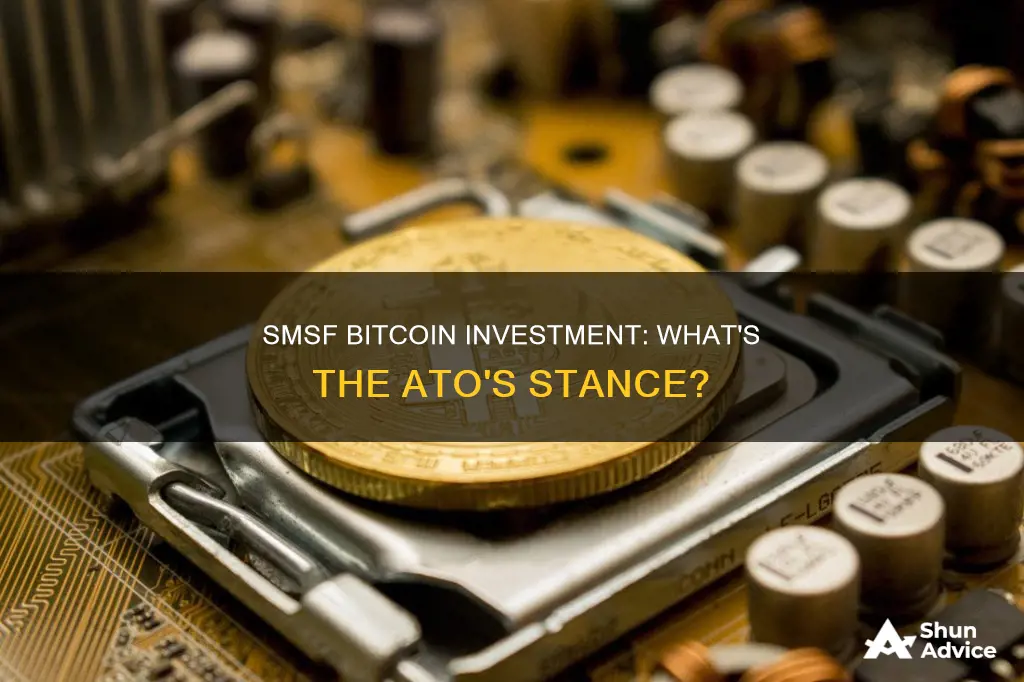
The emergence of cryptocurrencies like Bitcoin has sparked interest from Self-Managed Super Funds (SMSF) investors, who are now actively integrating cryptocurrencies into their investment portfolios. While SMSFs are not prohibited from investing in crypto assets, there are several factors to consider. For instance, the investment must be allowed under the fund's trust deed and comply with regulatory requirements. The volatile nature of cryptocurrencies has divided investors, with some arguing that crypto investments are inappropriate for SMSFs, while others draw comparisons to traditional stores of value like gold. Navigating the regulatory landscape and understanding the risks and tax implications are crucial when considering Bitcoin and other cryptocurrencies as part of an SMSF investment strategy.
| Characteristics | Values |
|---|---|
| Legality of SMSF investing in Bitcoin | SMSFs are not prohibited from investing in crypto assets, but the investment must be allowed under the fund's trust deed and be in accordance with the fund's investment strategy. |
| Regulatory requirements | SMSF investments in Bitcoin must comply with the same regulatory requirements as other investments, as set out in the Superannuation Industry (Supervision) Act (SISA) and Superannuation Industry (Supervision Regulations) (SISR). |
| Tax treatment | Crypto assets are considered capital gains tax (CGT) assets, triggering a CGT event when sold at a profit or a loss. Costs involved in trading cryptocurrencies cannot be claimed as a tax deduction. |
| Record-keeping | SMSFs must keep full records of their crypto transactions and ensure their crypto assets are valued in accordance with ATO valuation guidelines. |
| Ownership and separation of assets | SMSF crypto assets must be held and managed separately from personal or business investments of trustees and members, with clear ownership by the fund. |
| Related-party transactions | SMSFs are prohibited from acquiring crypto assets from related parties as they are not considered 'listed securities'. |
| Pension or benefit payments | SMSFs can make in-specie lump-sum payments by transferring crypto, triggering a CGT event. However, pension payments must be made in cash. |
| Voluntary disclosures | Trustees or members who believe they may have breached super laws should work with advisers to rectify the breach and consider making a voluntary disclosure. |
What You'll Learn

Bitcoin as an investment
Bitcoin is a form of digital currency that uses blockchain technology to support transactions between users on a decentralised network. It was launched in 2009 by a mysterious developer known as Satoshi Nakamoto. Bitcoin can be used as a currency or an investment.
Advantages of Investing in Bitcoin
There are several advantages to investing in Bitcoin. Firstly, it offers the potential for high returns. Bitcoin has experienced a meteoric rise in value since its inception, demonstrating the potential for significant growth in an SMSF portfolio. Bitcoin also acts as a hedge against traditional markets, providing independence from traditional financial markets and diversifying risk exposure.
Additionally, investing in Bitcoin provides access to innovative blockchain technology, allowing SMSF trustees to align their portfolios with technological innovation trends. The global accessibility of Bitcoin is another advantage, as it is accessible 24/7, and transactions can be executed across borders without intermediaries, making it attractive for investors seeking to diversify beyond domestic assets.
Regulatory Considerations for SMSFs
While SMSFs are not prohibited from investing in Bitcoin, there are several regulatory requirements that must be met. The investment must be allowed under the fund's trust deed and must comply with the fund's investment strategy. It is important to note that crypto assets are considered capital gains tax (CGT) assets for tax purposes, and SMSFs must keep full records of their crypto transactions.
To ensure compliance, SMSF trustees should consult financial and tax advisors who are well-versed in SMSF investments and cryptocurrencies. They can provide guidance on navigating the regulatory framework and ensuring that the investment strategy aligns with the fund's objectives and risk tolerance.
Bitcoin Investment Strategies
When incorporating Bitcoin into an SMSF investment portfolio, there are two main approaches: long-term holding and active trading. Long-term holding involves acquiring Bitcoin with the intention of holding it for an extended period, focusing on the long-term growth of the asset. On the other hand, active trading involves buying and selling Bitcoin to profit from short-term price movements, requiring a deeper understanding of market dynamics and more active management.
It is essential to define the SMSF's investment objectives, risk tolerance, time horizon, and diversification strategy before deciding on an investment approach. Regular review and adjustment of the investment strategy are also crucial to align with the fund's changing goals and market conditions.
Storing Bitcoins
If investing in Bitcoin, it is important to consider the storage options: hot wallets and cold wallets. Hot wallets are online storage solutions provided by cryptocurrency exchanges or standalone providers, accessible through a computer browser, desktop, or smartphone app. Cold wallets, on the other hand, are encrypted portable devices, similar to thumb drives, that allow you to download and carry your Bitcoins offline.
While hot wallets offer convenience, they are more susceptible to security risks. Cold wallets, being offline, provide a more secure way to store Bitcoin but require technical knowledge to set up.
Investing in Bitcoin offers potential benefits, such as high returns, diversification, and access to innovative technology. However, it is essential to carefully consider the regulatory requirements, develop a sound investment strategy, and choose appropriate storage solutions. Seeking professional guidance is crucial to ensure compliance and make informed investment decisions.
Bitcoin's Future: A Viable Investment?
You may want to see also

Trust deed and investment strategy
The Australian Taxation Office (ATO) has provided clear guidelines on how cryptocurrencies like Bitcoin are taxed within Self-Managed Super Funds (SMSFs). To ensure compliance, it is essential to understand the regulatory framework and consult with financial and tax advisors.
Complying with the Trust Deed and Investment Strategy:
Your SMSF's trust deed must allow for cryptocurrency investments, and such investments should align with your fund's investment strategy. The investment strategy outlines the investment objectives and specifies the types of investments the fund can make. Before investing in cryptocurrencies, SMSF trustees and members should consider the level of risk and review and update their fund's investment strategy if necessary.
Sole Purpose Test (SPT):
The primary purpose of an SMSF is to provide retirement benefits to its members. Any cryptocurrency investments should align with this sole purpose. Trustees must ensure that cryptocurrency investments are not intertwined with personal assets, as this would breach the sole purpose test.
Ownership and Storage:
Regulations specify how Bitcoin is owned and stored within an SMSF. The Digital Currency Exchange (DCE) account needs to be set up in the name of the SMSF, and cold storage devices need to be owned by the SMSF. SMSFs must also ensure that their crypto assets are held and managed separately from personal or business investments, including maintaining a separate crypto wallet.
Record-Keeping:
SMSF trustees should maintain accurate and comprehensive records of all cryptocurrency transactions, including purchases, sales, and wallet movements, to demonstrate compliance with tax and regulatory obligations.
Annual Audits:
SMSFs are subject to annual audits, and cryptocurrency holdings and transactions must be transparently documented and available for audit purposes to ensure compliance.
Tax Implications:
For tax purposes, crypto assets are considered capital gains tax (CGT) assets, triggering a capital gains tax event when sold at a profit. SMSFs must ensure their investments in crypto assets are valued in accordance with ATO valuation guidelines, using the fair market value obtained from a reputable digital currency exchange or website.
In summary, when integrating Bitcoin or other cryptocurrencies into your SMSF investment strategy, it is crucial to comply with the trust deed and investment strategy, adhere to the sole purpose test, maintain separate ownership and storage, keep detailed records, undergo annual audits, and understand the tax implications. Consulting with financial and tax advisors can provide tailored guidance and ensure compliance with regulatory requirements.
Little Money, Big Risk: Is Bitcoin Worth the Gamble?
You may want to see also

Identification and ownership
To trade in cryptocurrency, you need a unique encrypted code known as a wallet. The wallet is the address that transactions are sent between. An SMSF needs its own wallet, entirely separate from any personal cryptocurrency investments. Any investments made into cryptocurrencies must be identified as belonging solely to the SMSF and must not be mixed with personal assets.
As wallets are virtual and only identifiable via an IP address, it can be challenging for the fund to have the asset registered in any name. To ensure auditors can identify the fund's cryptocurrency assets, trustees should ensure the following:
- The trading history for the wallet at the IP address matches the transactions from the bank account of the fund.
- To ensure the accounts are easily traceable, it is recommended that the SMSF opens a separate bank account for cryptocurrency trading.
- Auditors will check that the transactions are for the sole benefit of the SMSF, not an individual.
- As the wallet cannot demonstrate that the investment is held solely for the SMSF, a deed of trust or similar document is required to confirm the fund is the beneficial owner of the cryptocurrency.
The super laws require trustees and members to ensure their fund's assets are held separately from personal assets. An SMSF's crypto assets must be held and managed separately from the personal or business investments of trustees and members. This includes ensuring the SMSF has clear ownership of the crypto assets. The fund must maintain and be able to provide evidence of a separate crypto wallet for the SMSF from that used by trustees and members personally.
The requirement for a trustee to be able to identify the assets of the fund can be challenging in the context of Bitcoin due to the anonymous nature of Bitcoin holdings. Processes should be put in place to ensure that a trustee can evidence any Bitcoin is held as a trustee of the SMSF. This could include using the fund's bank account when purchasing, passing relevant trustee resolutions, ensuring any exchange account is in the name of the SMSF trustee acting as trustee, creating a fund-specific email address, completing statutory declarations, and otherwise ensuring good documentary evidence exists to satisfy an auditor and the ATO.
Small Bitcoin Investments: Are They Worth the Risk?
You may want to see also

Regulatory requirements
The Australian Taxation Office (ATO) provides clear guidelines on the tax treatment of cryptocurrencies like Bitcoin within SMSFs. To ensure compliance, there are several key regulatory requirements that must be met:
- Trust Deed and Investment Strategy: The SMSF's trust deed must explicitly allow for cryptocurrency investments, and such investments should align with the fund's overall investment strategy.
- Sole Purpose Test (SPT): This test ensures that the primary purpose of the SMSF is to provide retirement benefits to its members. Cryptocurrency investments should support this primary purpose.
- Ownership and Storage: Regulations specify how Bitcoin is owned and stored within an SMSF. The Digital Currency Exchange (DCE) account must be set up in the name of the SMSF, and cold storage devices must be owned by the SMSF.
- Tax Implications: Cryptocurrency transactions within SMSFs may trigger tax events, including capital gains tax (CGT) when selling cryptocurrencies. SMSFs benefit from a concessional tax rate of 15%, and long-term capital gains are taxed at an effective rate of 10%.
- Record-Keeping: Comprehensive and accurate record-keeping is essential. SMSF trustees should maintain records of all cryptocurrency transactions, including purchases, sales, and wallet movements, to demonstrate compliance with tax and regulatory obligations.
- Annual Audits: SMSFs are subject to annual audits, during which cryptocurrency holdings and transactions must be transparently documented and available for review.
- Separation of Assets: SMSF regulations require the separation of assets between the fund and personal investments. This includes maintaining a separate crypto wallet for the SMSF, distinct from those used by trustees and members for personal investments.
- Valuation of Crypto Assets: SMSFs must value their crypto investments in accordance with ATO valuation guidelines, using the fair market value in Australian dollars obtained from a reputable digital currency exchange or website.
- Related-Party Transactions: SMSFs are generally prohibited from acquiring assets from related parties, and this includes crypto assets. As such, SMSF trustees and members cannot make in-specie contributions or transfers of crypto assets to the fund.
It is important to note that SMSFs are highly regulated, and investing in cryptocurrencies like Bitcoin adds a layer of complexity. SMSF trustees and members are strongly encouraged to seek independent professional advice before investing in crypto assets to ensure compliance with all regulatory requirements.
IRA Bitcoin Investment: What You Need to Know
You may want to see also

Tax implications
The Australian Taxation Office (ATO) treats Bitcoin transactions as a barter arrangement, and they are taxed accordingly. No GST is charged on the buying or selling of Bitcoin. However, it is regarded as an asset for Capital Gains Tax (CGT) purposes. If you sell Bitcoins and convert them into Australian dollars, you may be subject to CGT. The rate is currently 10% for self-managed super funds selling assets that have been held for longer than 12 months.
It is important to note that if you are currently drawing an SMSF pension, selling Bitcoin would not attract CGT under current Australian superannuation laws. However, as Bitcoin and other cryptocurrencies are still relatively new, their tax treatment regarding self-managed super funds may change over time.
When it comes to tax obligations, it is crucial to maintain accurate and comprehensive records. SMSF trustees should keep track of all cryptocurrency transactions, including purchases, sales, and wallet movements, to demonstrate compliance with regulatory requirements. Additionally, SMSFs are subject to annual audits, so cryptocurrency holdings and transactions must be transparently documented and available for audit purposes to ensure compliance.
A significant advantage of investing in Bitcoin through an SMSF is the favourable tax regime it offers. SMSFs benefit from a concessional tax rate of 15%, and long-term capital gains are taxed at an effective rate of 10%. This tax rate is notably lower compared to standard individual marginal tax rates.
The Bitcoin Investment: What's the Real Deal?
You may want to see also
Frequently asked questions
Yes, SMSFs can invest in Bitcoin and other cryptocurrencies. However, it is important to note that crypto assets are subject to regulatory requirements and tax implications.
To invest in cryptocurrencies, SMSFs must comply with the fund's trust deed and investment strategy and regulatory requirements set out in the Superannuation Industry (Supervision) Act (SISA) and Superannuation Industry (Supervision Regulations) (SISR). The investment must also be allowed under the fund's trust deed and must be separated from personal assets.
For tax purposes, cryptocurrencies are considered capital gains tax (CGT) assets. SMSFs must keep full records of their crypto transactions and ensure that any gains or losses are reflected in their tax returns.
Cryptocurrencies are a new and emerging asset class with a high level of volatility. SMSF trustees should carefully consider the risks associated with investing in cryptocurrencies and ensure that they have a well-diversified investment portfolio.







